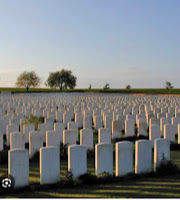Reflections on the duplicity of politicians
I'm going to start this post with a comment that is both uncontroversial to those who are experts on the subject and is now accepted as accurate by many military historians;
The British General, Field marshal Douglas Haig was both a highly competent and ultimately successful General of the Great War.
Many but certainly not all.
And significantly more controversially, I believe that the British Army, including the armies of the Dominion countries were possibly the best trained, effective fighting arm available to the allies by the end of the war, implementing the latest tactics of a fully integrated military force i.e the army, tank corp and RAF combined and coordinating to successfully destroy the German army in battle.
And finally, the last hundred days of the Great War represent the most successful period of British military operation ever. Never before or since has the British army enjoyed such success in countless battles in a single period of time.
I can hear the howls of outrage. Surely the British Generals were donkeys, who led their lions to certain death, using unchanging tactics, which involved men climbing out of trenches and walking slowly in the direction of the enemy.
Who industrially killed the British troops, with machine guns and artillery.
Well no. At least with regards to the donkeys accusation. Sadly the vast number of deaths in battle is true.
So doesn't the vast number of deaths show that the Generals were incompetent? Lived in luxury and safety in beautiful Chateau's safely far away from battle? Arrogant and careless of their soldiers lives?
No and to prove this we need to give some context.
In 1914, the British army, while increased in size and reorganized following the Haldane reforms, which Haig played a crucial role in developing, was still little more than an Imperial police force. It was not an army with the capability to fight a European war.. at least not on its own.
Kitchener advised the Government on the outbreak of war that it would take at least two years to recruit and train an army to be effective in a European land war. Until then the British army could play little effective part in the battles in France and Belgium.
It has to be said that Kitchener also had an alterior motive. He figured that the best thing for British interests was to build up the army whilst letting Germany and France slug it out to exhaustion and then with fresh well trained troops, impose it's will and be the leading continental power.
Unfortunately for this plan the French kept pleading for the British to open battles along it's section of the front.
Especially when they were bleeding at Verdun.
In the face of these French requests Haig initially resisted staging a battle on the Somme, at the time the French specified.
He didn't like the layout and felt it gave the enemy too many advantages.
Besides the pals battalions were not yet trained. The politicians at home instructed him otherwise. So Haig fought the politicians battle at a location and at a date he didn't want.
And the worst day in the history of the British army was recorded.
Haig did make mistakes. He tended to keep a battle going, long after it became obvious that no great breakthrough was going to happen. He also didn't always keep a firm grip on his generals.
He was a competent, but not a brilliant General.
He also took too long in getting a grip on the training required by his army. For the years 1915 to 1917, the Germans weren't impressed by the British armies tactical capabilities.
However all this changed with the battle of Amiens and the German armies darkest day. The final 100 days were a triumph for the British.
And after the war Haig was lauded at home.
So what happened? Well a politician will never accept the blame and the battles with their massive casualties provided a Scape goat. Haig, was a taciturn man, difficult to get to know, unclubable and at times overly sensitive.
Lloyd George the PM couldn't stand him and tried very hard to have him replaced. But failed. So he got his revenge in his post war Memoires.
He laid into Haig, who refused to comment. His reputation became tarnished and Lloyd George got away with not having to explain how the politicians failed to stop a war that led to millions of deaths.
Whilst it's the armed forces that fight a war, it's politicians that cause them.
And the Generals weren't uncaring. Over 50 of them died in the war. And many lost sons in battle, causing the pain and grief that we all would feel if our sons were to die.
They cared because the British army had a well established tradition of caring for the men and they also had skin in the game.
Lloyd George was a brilliant politician, with many achievements. He was also an amoral fraud, who cared more for his reputation, that for the truth.
Somethings are eternal.


Comments
Post a Comment